Related Research Articles
In video games, a power-up is an object that adds temporary benefits or extra abilities to the player character as a game mechanic. This is in contrast to an item, which may or may not have a permanent benefit that can be used at any time chosen by the player. Although often collected directly through touch, power-ups can sometimes only be gained by collecting several related items, such as the floating letters of the word 'EXTEND' in Bubble Bobble. Well known examples of power-ups that have entered popular culture include the power pellets from Pac-Man and the Super Mushroom from Super Mario Bros., which ranked first in UGO Networks' Top 11 Video Game Powerups.
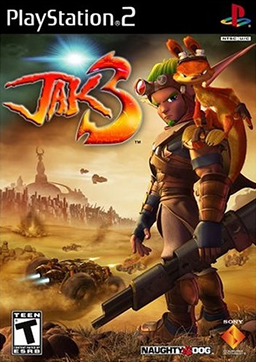
Jak 3 is a 2004 action-adventure video game developed by Naughty Dog and published by Sony Computer Entertainment for the PlayStation 2. The game is the sequel to Jak II, the third game in the series and serves as the conclusion of the trilogy. The game picks up after the events of the previous games and the player takes on the dual role of recurring protagonists Jak and Daxter. It adds new weapons, devices and playable areas. The game was followed by Jak X: Combat Racing.
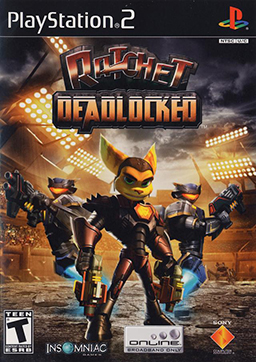
Ratchet: Deadlocked is a 2005 action platformer, developed by Insomniac Games and published by Sony Computer Entertainment for the PlayStation 2 as the fourth installment of the Ratchet & Clank series.
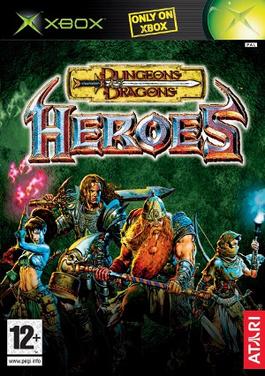
Dungeons and Dragons: Heroes is a hack and slash video game with RPG elements. It was published by Atari Interactive and developed by the subsidiary's Hunt Valley development studio, exclusively for Xbox in 2003. It is set in the Dungeons & Dragons universe and is playable solo or with up to four players. Players take on the role of four reincarnated heroes brought back to life to fight their former nemesis, a wizard named Kaedin.
Sins of a Solar Empire is a 2008 science fiction real-time strategy video game developed by Ironclad Games and published by Stardock Entertainment for Microsoft Windows operating systems. It is a real-time strategy (RTS) game that incorporates some elements from 4X games; its makers describe it as "RT4X". Players are given control of a spacefaring empire in the distant future, and are tasked with conquering star systems using military, economic and diplomatic means.

Castle Crashers is a 2D side-scrolling hack-and-slash video game developed by The Behemoth. The Xbox 360 version was released on August 27, 2008, via Xbox Live Arcade as part of the Xbox Live Summer of Arcade. The PlayStation 3 version was released in North America on August 31, 2010, and November 3, 2010, in Europe via the PlayStation Network. A Microsoft Windows version, exclusive to Steam, was released on September 26, 2012. The game is set in a fictional medieval universe in which a dark wizard steals a mystical crystal and captures four princesses. Four knights are charged by the king to rescue the princesses, recover the crystal, and bring the wizard to justice. The game includes music created by members of Newgrounds.

Counter-Strike Online (CSO) is a tactical first-person shooter video game, targeted towards Asia's gaming market released in 2008. It is based on Counter-Strike and was developed by Nexon with oversight from license-holder Valve. It uses a micropayment model that is managed by a custom version of Steam.
Virtual goods are non-physical objects and money purchased for use in online communities or online games. Digital goods, on the other hand, may be a broader category including digital books, music, and movies. Virtual goods are intangible by definition.
Playfish was a developer of free-to-play social network games. Playfish was founded in 2007 by Kristian Segerstråle, Sebastien de Halleux, Sami Lababidi, and Shukri Shammas. It closed in 2013. Playfish in the past had attracted up to 55 million users a month, with over 37 million users coming from Facebook users. In October 2008, they secured US$17 million in venture capital funding from Accel Partners and Index Ventures. The company was acquired by Electronic Arts in 2009, with the last of Playfish's games being retired in 2013.

Artix Entertainment, LLC is an independent video game developer and publisher founded by Adam Bohn in October 2002. It is best known for creating browser-based role-playing video games—including AdventureQuest, DragonFable, MechQuest, and AdventureQuest Worlds—using Adobe Flash. The company released its first title for iOS and Android devices in March 2011 and on October 19, 2016, released its first 3D game, AdventureQuest 3D, with the Unity game engine.
Treasure Isle is a defunct browser-based video game by Zynga for Facebook, launched in April 2010. It allowed users to dig for treasure on various islands. The game was discontinued on December 5, 2012.

Facebook Credits was a virtual currency that enabled people to purchase items in games and non-gaming applications on the Facebook Platform. One U.S. dollar was the equivalent of 10 Facebook Credits. Facebook Credits were available in 15 currencies including U.S. dollars, pound sterling, euros, and Danish kroner. Facebook was hoping eventually to expand Credits into a micropayment system open to any Facebook application, whether a game or a media company application. Facebook deprecated Credits in favour of users' local currencies.
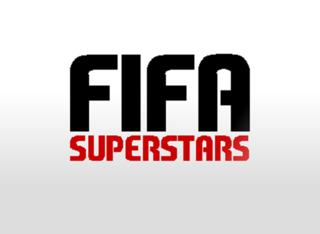
FIFA Superstars was a football managing game developed by Playfish and Electronic Arts. It was released for play via Facebook in 2010, with a mobile version for iOS releasing the following year. In the game, users take the role of a football manager, managing a team by purchasing players, hiring a coach, upgrading the stadium and keeping the club fit in practice. FIFA Superstars is the first social gaming entry point for the FIFA franchise. FIFA Superstars became unavailable starting 31 March 2013.
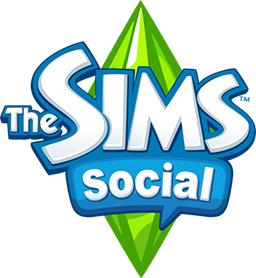
The Sims Social was a Facebook addition to the Sims series of video games. It was announced during the Electronic Entertainment Expo 2011 press conference. As with the original Sims games, The Sims Social lets the user create their own customizable character. In this version, however, the player uses their character to interact with those of their Facebook friends. The characters can develop likes or dislikes for other Sims, creating relationships that can be publicized on the user's Facebook page.

SimCity Social is a defunct online social game for the Facebook social network where users create their own city and interact with cities of their Facebook friends. The game was developed by Playfish and published by Electronic Arts. The game was announced at the Electronic Entertainment Expo 2012, during EA's press conference on June 4, 2012, and released on June 25, 2012.
Zombie Gunship is a first-person shooter mobile game with a 3D thermal imaging display, where the player is a gunner who fires at zombies from a heavily armed AC-130 ground attack aircraft circling various user-selected maps. The mobile game was developed by Limbic Software and released July 21, 2011 for Apple’s iOS, September 19, 2013 for Android on the Google Play Store, and October 8, 2013 on Amazon.
Plunder Pirates is a freemium mobile MMO pirate-themed strategy video game, inspired by Clash of Clans, developed and published by Midoki. For iOS, it soft-launched in Canada and Finland on June 16, 2014, and the worldwide iOS release was on September 17, 2014. The game was one of the first to use Metal for advanced graphics in iOS 8. The Android version was released on April 22, 2015. It was originally published by Rovio Stars.
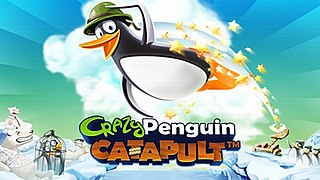
Crazy Penguin Catapult is an action-adventure mobile game developed by Sumea and published by Digital Chocolate for Java ME mobile devices in 2007, and later ported to Microsoft Windows and iOS. The game revolves around courageous penguins fending off their territories from invading polar bears using a catapult. It is reminiscent of Yetisports and is believed to have inspired the famous Angry Birds mobile game which it predates by two years.
Township is a casual farming and city-building game developed and launched on multiple platforms by Playrix in which players develop starter towns by building factories, harvesting crops, and creating goods. The main goal of the game is to link one independent agriculture operation into a complete set of industrial chains, increase income, expand the territory, and make your town more prosperous by increasing the population. Township was originally available as an Adobe Flash application on WhatsApp Social and was later released on the App Store, Google Play, Appgallery, Amazon Appstore, Microsoft Store & Mac App Store.
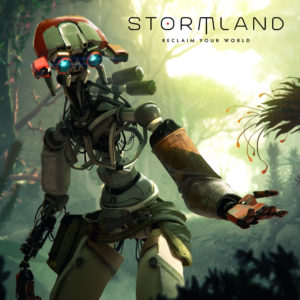
Stormland is a 2019 action-adventure game developed by Insomniac Games and published by Oculus Studios for the Oculus Rift virtual reality (VR) headset. The game put emphasis on both exploration and combat as the player character, an android gardener named Vesper, traverses an alien planet from a first-person perspective. The game received generally positive reviews from critics upon release.
References
- ↑ "Crazy Planets: The Worms of Facebook". VentureBeat. Retrieved 2018-09-14.
- ↑ Tanner, Nicole (2009-12-21). "Facebook Games That Don't Suck". IGN. Retrieved 2018-09-14.
- ↑ "Crazy Planets: A Detailed Look at The Latest Facebook Game From Playfish" . Retrieved 2018-09-14.
